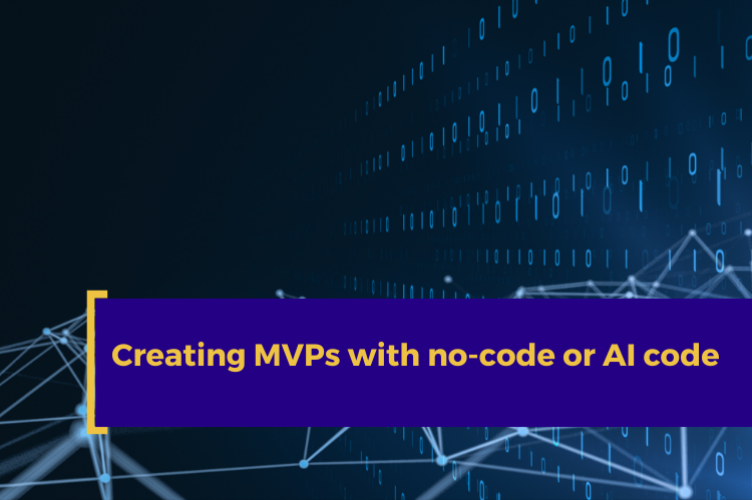Speed up prototyping with no-code or AI code applications
An interview with tech entrepreneur and EMDIEL instructor Stephan von Perger
 The emergence of AI tools has opened up new possibilities for founders, enabling faster idea-to-prototype development—even without coding experience—and making it easier to build minimum viable products (MVPs) to test products and business models.
The emergence of AI tools has opened up new possibilities for founders, enabling faster idea-to-prototype development—even without coding experience—and making it easier to build minimum viable products (MVPs) to test products and business models.
In the Executive Master in Digital Innovation and Entrepreneurial Leadership (EMDIEL), the third module is dedicated to prototyping & business modelling. With the rise of low-code & no-code platforms, as well as AI-powered code generation, also known as vibecoding, participants of the EMDIEL are now able to create MVPs and apps to test their business ideas at the speed of light. We have spoken to Stephan von Perger, who teaches the creation of MVPs with no-code and AI methods.
Stephan holds a Computer Science degree from Oxford and has worked at McKinsey, in VC, and as a founding team member at Zenjob. He co-founded and now co-leads both InnovatorsRoom, connecting founders, investors, and corporates, and QNTF, which helps early-stage startups use AI, set up growth analytics, and achieve product-market fit.
Just looking at your profile and current jobs, you don’t strike us as someone who is in urgent need of no-code or AI code. Can you tell us how and why you got started in this area?
My journey into no-code and AI methods began quite organically in 2015. I started using basic no-code tools like Trello, Bitly, and later also Airtable and Make.com to structure and automate manual tasks, particularly for my VC and startup jobs newsletters. These tools helped me efficiently prepare links to jobs and organize content without coding.
As I pushed these platforms to their limits, I often encountered frustrating constraints in customization. This naturally led me to explore AI-powered coding tools like Cursor.com coming on the market in 2024, which offers a middle ground - they generate code I could own and modify without platform lock-in. And it's exciting to see the hype around vibecoding being all over the Internet now.
What started as a practical solution to automate repetitive tasks evolved into a fascinating exploration of how these technologies can empower founders to build and iterate quickly.
What do you consider to be the main advantages of no-code and AI methods for founders and entrepreneurs?
The advantages are transformative for entrepreneurs: No-code platforms enable incredibly fast MVP deployment without writing a single line of code. For initial validation, this speed is invaluable.
AI coding tools offer the best of both worlds - the flexibility of custom code without the traditional development timeline. I've found that copy-pasting generated by LLMs and making adjustments is far more accessible than learning entire no-code tools like Bubble or Make from scratch.
Perhaps most importantly, these approaches enable "learning by doing" - founders can build working products quickly without deep technical knowledge, tinker with their solutions, and iterate based on real feedback rather than theoretical planning.
Where do you see potential challenges or maybe even ethical dilemmas when it comes to using AI code to create your MVPs?
Despite their benefits, several challenges exist:
No-code platforms often become expensive as you scale, and their design constraints and rigid logic blocks can be frustrating when building complex functionality.
With AI-generated code, maintainability can become an issue over time. LLMs sometimes lose context or introduce subtle bugs if not prompted carefully, and the resulting codebase can become difficult to manage without good organization. The AI tools can of course also help you do that, but it's often more fun to just focus on the next new feature rather than putting in the time to clean up existing code.
Are there cases where you would recommend entrepreneurs that they renounce on no-code or AI code?
In regulated industries, extra care is definitely needed when working with AI-generated code. AI MVPs may not immediately meet all security or compliance requirements without proper vetting.
That said, it's worth noting that human developers can also miss critical issues. The key is appropriate review and testing, regardless of how the code was generated.
Rather than avoiding these tools entirely in sensitive contexts, I recommend a hybrid approach - use AI-code for rapid prototyping, then involve specialists to review and strengthen the implementation before real world deployment to any paying customers.
You work in companies that probably attract founders and entrepreneurs from all walks of life and many different countries. Do you see generational or cultural differences in the use of AI powered products?
In Germany particularly, I've noticed that data privacy concerns make AI adoption sometimes slower than in other markets. Many professionals express discomfort sharing data with LLMs, for all the right reasons.
Despite these concerns, I've observed that many people are still experimenting with these tools quietly, recognizing their potential and using them to improve and increase their work output.
The divide isn't strictly generational but seems more related to individual risk tolerance and privacy values, which can vary significantly across different markets.
What was the most impressive MVP that you have yet seen built without founders being able to code?
One standout example is FINN from Munich, who used a combination of Airtable and Make to launch their initial MVP, later transitioning to NocoDB as they scaled. Their ability to validate their concept and attract users and investment without traditional development is remarkable and there are probably many more stories of tech-enabled startups who got started in a similar way leveraging tools like Airtable, HubSpot, and Make to create sophisticated workflows and customer experiences without writing any code.
With the speed that tools are evolving, how do you keep up with them? And how do you identify tools that are relevant for your goals?
Staying current requires a multi-faceted approach for me: I follow a few content creators and experts on social media who seem to be at the forefront of these technologies, but it's not clear if it's just hype or real value add.
Regular hands-on experimentation is also crucial - I dedicate time to test new tools on small projects to understand their capabilities and limitations. Recently, I also launched Vaibecoding, a meetup to bring together AI vibecoders, creating a community where we can collectively explore and evaluate emerging tools.
Campuses
